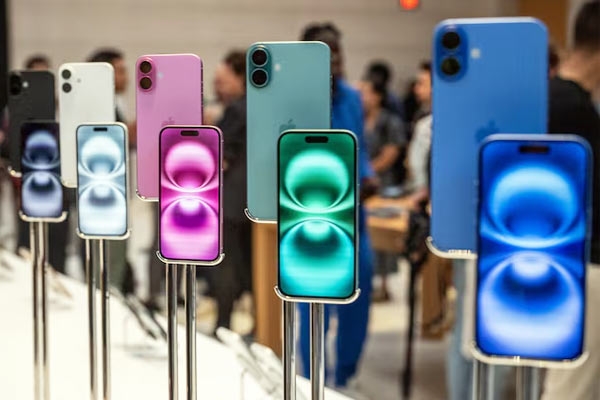
(Image source from: Bloomberg)
The significant threat of new tariffs from the Trump administration has caused a drastic decline in the share price of Apple Inc., yet there has been a temporary upside: a surge of customers heading to retail outlets to purchase iPhones. Employees from various Apple stores nationwide reported a weekend filled with shoppers, many of whom voiced fears about impending price increases after the tariffs take effect. The majority of iPhones, which represent Apple’s top-selling and most crucial product, are produced in China, where they could face a tariff as high as 54%. One employee noted that their store experienced an overwhelming influx of customers buying phones in a panic. “Nearly every shopper inquired whether prices would increase soon,” the employee stated, preferring to remain anonymous due to a lack of authorization to speak publicly.
While the crowds didn’t quite match the long lines typical of an iPhone launch, employees remarked that the environment resembled the hectic holiday shopping period. “Customers are hurrying in, concerned and full of questions,” one remarked, mentioning that the company had not provided guidance on how to respond to such concerns. This surge in shopper activity has led to increased sales. Recent data revealed that Apple’s retail locations in the United States recorded higher sales over the past weekend compared to previous years in several key markets, according to an informed source. An Apple representative chose not to comment on the situation. The company is scheduled to release its fiscal Q2 results on May 1, which will provide CEO Tim Cook and CFO Kevan Parekh a chance to address the anticipated impact of the tariffs. During a conference call in the holiday quarter, Cook indicated that the company was evaluating the potential effects but offered no further details.
The stock market’s turmoil related to tariffs has particularly affected Apple. Over the last two days of trading last week, the company’s valuation plummeted by over half a trillion dollars, resulting in the largest three-day decline since the fallout from the dot-com bubble in 2001. To prepare for the tariffs, Apple has been taking proactive measures, such as increasing its inventory levels. Additionally, as a strategy to mitigate losses in the future, Apple is shifting a greater number of products manufactured in India to the US market, with reports from Bloomberg indicating that tariffs there will be lower than those applicable in China.
Apple has invested considerable time in relocating much of its manufacturing to Vietnam, where tariffs are expected to be more favorable compared to those in China. The company has produced a range of products in Vietnam, including Apple Watches, Macs, AirPods, and iPads. Additionally, certain Mac models are made in Ireland, Thailand, and Malaysia.
On a busy Monday afternoon, Apple’s prominent retail outlet on Fifth Avenue in New York attracted many visitors. Ambar De Elia, who hails from Buenos Aires, was in New York and had made up her mind to purchase an iPhone 15 for her younger sister. However, after checking the morning news regarding Wall Street, she decided it was an opportune moment to indulge.
Market analysts and industry experts are assessing the potential repercussions of a 54% tariff on imports from China, with some predicting that the price of iPhones might escalate to thousands of dollars each. Nonetheless, reports from Bloomberg News suggest that Apple is likely to implement various strategies, including pressuring suppliers and accepting reduced profit margins, to prevent prices from rising excessively. Currently, the starting price for Apple’s latest flagship iPhone is $999, a figure that has remained unchanged since 2017. “I believe everyone is here out of concern and uncertainty about future developments,” De Elia commented. “If we can buy something at a lower price, we definitely will.”
One store employee expressed confidence that the influx of customers would persist in the coming days. Another staff member pointed out that this time of year is generally considered slow, as new iPhones are typically launched in September, but many shoppers are opting to upgrade at this moment. This increase in sales could positively influence Apple’s third quarter results, which will continue until the end of June. Since the company is currently selling off its existing inventory, the tariff effects might not be fully realized until the subsequent quarter.







